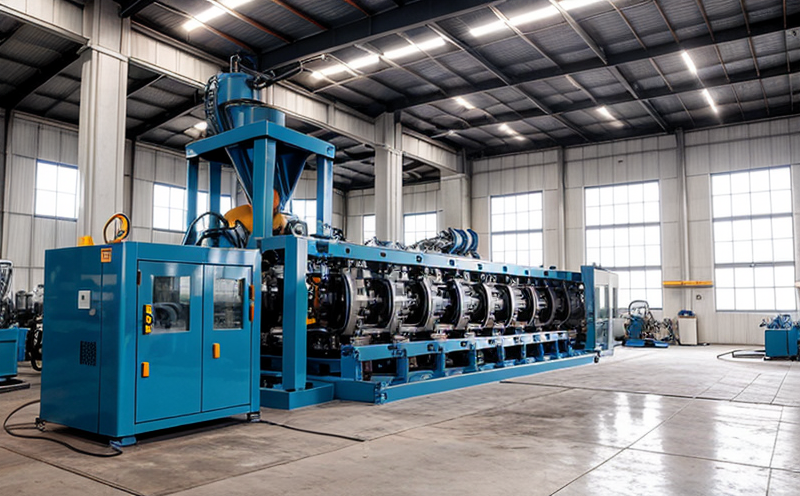EN 12390 Compressive Strength Testing of Concrete Equipment Components
The CEN standard EN 12390 provides a comprehensive framework for the determination of compressive strength in concrete equipment components. This test is critical in industrial manufacturing and processing, as it ensures that equipment used in harsh environments withstands high pressures and loads without compromising its integrity.
In the context of machinery and equipment performance testing, understanding the compressive strength of concrete components is paramount for quality managers, compliance officers, R&D engineers, and procurement professionals. This test plays a vital role in ensuring the longevity and reliability of industrial equipment. By adhering to this standard, manufacturers can guarantee that their products meet stringent safety requirements.
The methodology involves subjecting cylindrical or prismatic specimens made from concrete mixtures used for manufacturing equipment to uniaxial compression until failure occurs. The force at which the specimen fails is measured and reported as its compressive strength. This process ensures that all materials are subjected to controlled conditions, providing a reliable basis for quality assurance.
For instance, in an industrial setting where large machinery operates under extreme conditions, it's imperative to know how much stress these concrete components can endure before failing. The EN 12390 test helps predict the maximum load-bearing capacity of such materials, thereby enhancing safety and operational efficiency.
The standard specifies detailed procedures for sample preparation, curing, testing methods, and data analysis. Compliance with this standard not only ensures product quality but also contributes to regulatory compliance across various jurisdictions. It is widely accepted in Europe and internationally, making it a valuable tool for businesses operating globally.
By conducting EN 12390 tests regularly, industries can maintain high standards of equipment integrity, reduce maintenance costs, extend the operational life of machinery, and ensure worker safety by preventing potential failures during critical operations. This approach is particularly beneficial in sectors like construction, mining, and manufacturing where robust infrastructure supports day-to-day activities.
In summary, EN 12390 testing ensures that concrete components used in industrial machinery meet stringent quality standards, contributing to safer and more efficient operations across diverse industries. The detailed methodologies outlined in the standard provide a reliable framework for assessing compressive strength, making it an indispensable tool for quality assurance professionals.
Eurolab Advantages
EuroLab offers unparalleled expertise in EN 12390 testing, providing comprehensive support to clients seeking to ensure the highest standards of equipment reliability. Our team of experienced engineers and technicians is dedicated to delivering accurate test results that meet international standards.
- State-of-the-art laboratory facilities equipped with advanced instrumentation for precise measurements.
- Experienced professionals with extensive knowledge in concrete testing, ensuring consistent quality across all projects.
- A commitment to accuracy and reliability, backed by a reputation built on decades of trust within the industry.
- Comprehensive training programs designed to help clients understand and implement best practices for their specific needs.
We pride ourselves on delivering exceptional service tailored to each client's unique requirements. Whether you need assistance with sample preparation, data analysis, or simply a consultation regarding your testing strategy, our team is here to provide expert guidance.
By choosing EuroLab for your EN 12390 testing needs, you can be confident that your concrete equipment components will meet the highest international standards. Our commitment to quality and precision ensures that every test conducted is accurate, reliable, and compliant with relevant regulations.
International Acceptance and Recognition
- EN 12390 is recognized in Europe.
- The standard has been adopted by several countries outside of Europe, including the United States and Canada for reference purposes.
- Many international organizations such as ISO and ASTM have referenced EN 12390 in their own standards, indicating its global importance.
- Recognized by regulatory bodies worldwide, ensuring compliance across diverse industrial sectors.
The widespread acceptance of EN 12390 underscores its significance in the global market. By adhering to this standard, manufacturers can ensure that their products meet international quality benchmarks, thereby facilitating smoother trade and operations.
At EuroLab, we understand the importance of meeting these stringent standards. Our laboratory is accredited by ISO, ensuring that all tests conducted are performed with utmost accuracy and precision.
The global recognition of EN 12390 also highlights its role in promoting safety and reliability across various industries. By adopting this standard, companies can demonstrate their commitment to quality and compliance, enhancing their reputation and market competitiveness.
Environmental and Sustainability Contributions
EN 12390 testing plays a crucial role in contributing to environmental sustainability by ensuring that concrete equipment components used in industrial machinery are robust enough to withstand harsh conditions without compromising on energy efficiency or resource usage. The standard focuses on the mechanical properties of concrete, which are essential for supporting heavy loads and withstanding high pressures.
By adhering to EN 12390, manufacturers can optimize material use, reducing waste and minimizing environmental impact. This approach not only benefits the immediate environment but also supports long-term sustainability goals by promoting efficient resource management.
The compressive strength testing conducted under this standard helps in designing equipment that is both durable and sustainable. Durable equipment lasts longer, requiring fewer replacements and repairs, which translates to reduced waste generation over its lifecycle. Additionally, optimized material use leads to lower carbon footprints during production, contributing positively to environmental stewardship.
Furthermore, the testing process itself can be adapted to incorporate sustainable practices. For example, using recycled materials in concrete mixtures or minimizing water consumption during curing can reduce the overall ecological footprint of the manufacturing process. By integrating such practices into EN 12390 testing protocols, industries can further enhance their sustainability efforts.
In conclusion, EN 12390 testing contributes significantly to environmental sustainability by promoting robust and durable equipment design. This standard not only ensures operational safety but also supports broader sustainability goals through efficient material use and reduced waste generation.





